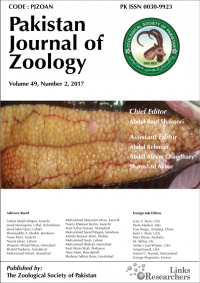Evaluation of Methicillin Resistance in Field Isolates of Staphylococcus aureus: An Emerging Issue of Indigenous Bovine Breeds
Evaluation of Methicillin Resistance in Field Isolates of Staphylococcus aureus: An Emerging Issue of Indigenous Bovine Breeds
Nauman Zaheer Ghumman, Muhammad Ijaz*, Arslan Ahmed, Muhammad Umar Javed, Iqra Muzammil and Ahmed Raza
ABSTRACT
The emergence of resistant strains of Staphylococcus aureus particularly methicillin-resistant S. aureus (MRSA) confers overwhelming economic losses to the global dairy industry. The current study was planned to investigate the S. aureus and MRSA associated subclinical mastitis in 345 milk samples (Cattle n=173, Buffalo n=172) collected from indigenous bovines of district Rawalpindi, Pakistan. The milk samples were screened for S. aureus and the confirmed isolates were subjected to disc diffusion test, PCR, and SDS-PAGE analysis for the confirmation of methicillin resistance. The farm-associated and individual animal-associated risk factors were analyzed to check the association with S. aureus and MRSA-associated subclinical mastitis. The results revealed an overall molecular prevalence of 28.70% for S. aureus among which MRSA-associated mastitis was found 47.62% prevalent. The SDS-PAGE analysis depicted the presence of a 78KDa protein band specific for PBP2a protein in MRSA. The comparative risk factor analysis showed significant variation among risk factors associated with S. aureus and MRSA-induced mastitis. The phylogenetic analysis of MRSA mecA gene showed a high resemblance of the study isolates with MRSA isolates of the USA, Turkey, India, Africa, and Brazil. This is the first study regarding molecular characterization and phylogenetic analysis of MRSA isolates from the study area.
To share on other social networks, click on any share button. What are these?









